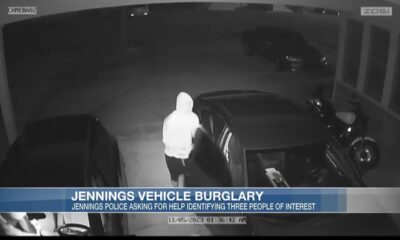Louisiana Illuminator
Suit alleging suppression of free speech met with skepticism at U.S. Supreme Court • Louisiana Illuminator
Suit alleging suppression of free speech met with skepticism at U.S. Supreme Court
by Ashley Murray, Louisiana Illuminator
March 18, 2024
WASHINGTON — The U.S. Supreme Court seemed skeptical Monday of a lawsuit alleging the federal government colluded with social media companies to suppress the freedom of speech, with a majority of justices across the ideological spectrum raising issues with the case and its potential consequences.
The Biden administration argued to the court there is no evidence that the government violated the First Amendment in its efforts to combat false, misleading or dangerous information online.
Beyond that, the court should dismiss the litigation because plaintiffs don't have the right to sue, said Brian Fletcher, principal deputy solicitor general.
Arguments occurred in a packed courtroom, where just outside dozens of protesters held signs accusing the government of infringing on free speech.
The lawsuit was filed in 2022 by two states — Missouri and Louisiana — and five individuals who either were banned from a platform or whose posts were not prominently featured on social media sites such as Facebook, YouTube and X, formerly known as Twitter.
Fletcher argued that the plaintiffs have not shown any evidence that decisions by social media companies to remove or deprioritize content can be attributed to the government. Instead, the companies made their own decisions relying on their own content moderation policies.
There was no coercion or attempted intimidation, Fletcher said, and the best proof of that is that social media companies “routinely said ‘no' to the government.”
“They didn't hesitate to do it, and when they said ‘no' to the government, the government never engaged in any sort of retaliation,” Fletcher said. “Instead, (the federal government) engaged in more speech. Ultimately, the president and the press secretary and the surgeon general took to the bully pulpit. We just don't think that's coercion.”
Benjamin Aguiñaga, the solicitor general for the Louisiana attorney general, argued that the government has no right to persuade platforms to violate Americans' constitutional rights, “and pressuring platforms in back rooms shielded from public view is not using the bully pulpit at all. That is just being a bully.”
Emails obtained as part of the lawsuit, Aguiñaga contends, show the government badgered platforms behind closed doors, abused them with profanity and “ominously says that the White House is considering its options… all to get the platforms to censor more speech.”
“Under this onslaught,” he said, “the platforms routinely cave.”
GET THE MORNING HEADLINES DELIVERED TO YOUR INBOX
Encouragement vs. coercion
Government agencies have routinely encouraged social media companies to restrict harmful or illegal content for years, including posts involving terrorism and human trafficking.
Aguiñaga argued that speech involving criminal activity is not protected. But the Biden administration, he said, began to push social media companies in 2021 to restrict misinformation about the COVID-19 vaccine.
Content was also targeted that involved election disinformation.
In 2022, U.S. District Judge Terry Doughty, a court nominee of President Donald Trump, ruled that officials under both President Joe Biden and Trump coerced social media companies to censor content over concerns it would fuel vaccine hesitancy during the COVID-19 pandemic or upend elections.
The 5th U.S. Circuit Court of Appeals in New Orleans prohibited the White House, the Surgeon General's Office, the FBI, and the Centers for Disease Control and Prevention from having practically any contact with the social media companies. It found that the Biden administration most likely overstepped the First Amendment by urging the major social media platforms to remove misleading or false content.
The Supreme Court placed a temporary stay on the order in October until it decides the case.
Standing and traceability
Another question at the core of Monday's arguments was whether any harm to the plaintiffs could be, in fact, traced back to the government's actions or could be remedied by judicial relief.
Justice Elena Kagan asked Aguiñaga to highlight “the single piece of evidence that most clearly shows the government was responsible for one of your clients having material taken down.”
“How do you decide that it's government action as opposed to platform action?” Kagan followed.
Aguiñaga pointed to a May 2021 email the Biden administration sent to a social media platform regarding misinformation about COVID-19. Aguiñaga argued that evidence shows two months later content from one of the plaintiffs, Jill Hines of Louisiana, was suppressed.
“A lot of things can happen in two months,” Kagan said. “So that decision two months later could have been caused by the government's email or that government email might have been long since forgotten because there are a thousand other communications that platform employees have had with each other, a thousand other things that platform employees have read in the newspaper.”
“I mean why would we point to one email two months earlier and say it was that email that made all the difference?” Kagan said.
Consequences for public safety, national security
During Monday's arguments, the justices focused on whether encouragement by federal officials amounted to illegal coercion, rather than merely informing or persuading social media companies.
“There are lots of contexts where government officials can persuade private parties to do things the officials couldn't do directly,” Fletcher argued when Justice Clarence Thomas questioned him about coercion versus censorship.
“For example, recently after the Oct. 7 attacks on Israel, a number of public officials called on colleges and universities to do more about antisemitic hate speech on campus,” Fletcher said.
An ideologically diverse majority of justices raised concerns about the potential consequences of the litigation for things like public safety and national security.
Justice Brett Kavanaugh questioned whether the government violates the First Amendment when it requests the removal of factually inaccurate posts. He suggested there could be national security concerns if false information was posted online about troops.
Kavanaugh also asked how the federal government's communications with social media companies were any different than when news organizations are warned that a story they are about to publish could affect national security.
Justice Amy Coney Barrett continued along that line of questions, asking whether the FBI would still be able to warn social media platforms if an individual had been doxxed in a way that might put them at risk.
Aguiñaga countered that he is a free speech purist but in that circumstance, the government would be allowed to issue warnings to social media companies about content.
But when speech is protected, the government has no right to intervene to push for it to be censored, he said.
“When the government is identifying a specific viewpoint and specific content that it wishes to wholly eliminate from public discourse, that's when the First Amendment problem arises,” he said, later adding that the government has lots of tools at its disposal to combat misinformation.
“Censorship,” he said, “has never been the default remedy for a perceived First Amendment violation.”
That argument didn't move Justice Ketanji Brown Jackson.
“You have to admit that there are certain circumstances,” she said, “in which the government can provide information and encourage the platforms to take it down.”
The most scathing criticism of the day came from Justice Sonia Sotomayor.
“I have such a problem with your brief, counselor,” Sotomayor said to Aguiñaga. “You omit information that changes the context of some of your claims. You attribute things to people who it didn't happen to. I don't know what to make of all this.”
Aguiñaga apologized if “any aspect of our brief was not as forthcoming as it should have been.”
Justice Samuel Alito, who sat back and rocked his chair with his hands behind his head, seemed most sympathetic to the plaintiffs' case, reframing the discussion as Aguiñaga was facing a series of difficult questions.
“Coercion doesn't only apply when the government says ‘do this, and if you don't do this, there are going to be legal consequences,'” Alito said, adding: “It's a more flexible standard and… you have to take into account the whole course of the relationship.”
In his rebuttal, Fletcher compared the Biden administration's communications with social media companies and public comments about misinformation to President George W. Bush's public condemnation of pornography and President Ronald Reagan's criticism of media influence of drugs and violence.
A ruling on the case is not expected for several months.
Plaintiff reaction
Missouri Attorney General Andrew Bailey said afterward he believes the Supreme Court justices “will make the right decision here.”
“Ultimately that (decision) will continue to build a wall of separation between tech and state using this lawsuit. The court will affirm the district court injunction and we're excited to get back to the district court level,” Bailey told reporters on the plaza in front of the Supreme Court after arguments concluded.
When asked for his reaction to the justices' skepticism of Aguiñaga's argument of government coercion, Bailey said “the evidence clearly establishes coercion.”
Bailey argued that evidence gathered by Missouri, Louisiana and the individual plaintiffs reveals the Biden administration threatened reform of Section 230 of the Communications Decency Act, which currently shields social media companies from liability for content published on their platforms.
“Those are direct explicit threats against the big tech social media giants,” he said.
The Department of Justice declined to comment on the ongoing litigation.
Jason Hancock reported from Columbia, Missouri. Ashley Murray reported from Washington, D.C.
Louisiana Illuminator is part of States Newsroom, a nonprofit news network supported by grants and a coalition of donors as a 501c(3) public charity. Louisiana Illuminator maintains editorial independence. Contact Editor Greg LaRose for questions: info@lailluminator.com. Follow Louisiana Illuminator on Facebook and Twitter.
The post Suit alleging suppression of free speech met with skepticism at U.S. Supreme Court • Louisiana Illuminator appeared first on lailluminator.com
Louisiana Illuminator
Gambling on a constitutional convention • Louisiana Illuminator
by Robert Collins, Louisiana Illuminator
May 16, 2024
Louisiana Gov. Jeff Landry recently requested that the Legislature call a constitutional convention. He says the current constitution is too restrictive, and forbids cuts to most agencies, resulting in most cuts falling on higher education and healthcare. He also says that most of the amendments in the constitution should be statutes that can be changed by the state Legislature.
The enabling legislation that made it out of the House proposes to hold a two-week convention starting Aug.1, with convention committees meeting prior to the convention to receive public comments.
The current Louisiana constitution is a flawed and excessively-amended document and should be rewritten at some point. However, the legislation being sent over to the Senate for debate is setting up a rushed, high-risk process that makes it difficult for ordinary citizens to have their voices heard. It would increase the influence of the governor by giving him more discretionary power over how state money is spent, but it's unclear how it would help ordinary citizens.
The first problem with current convention legislation is the lack of public input. The constitutional convention of 1973 had a long series of open meetings that stretched over an entire year. Meetings were not only held in Baton Rouge. Committee members traveled to all parts of the state to make sure that any citizen who wanted to participate in a public meeting received the opportunity.
The 1973 convention was composed primarily of elected delegates. Some were state lawmakers, some were local officeholders, but many were simply private citizens who chose to run for a delegate seat. The current legislation calls for a convention of strictly state legislators and gubernatorial appointees. It's not really a recipe for broad public participation.
This is especially problematic for the urban areas of the state. The main protection that a city such as New Orleans, a heavily Democratic city in a Republican state, has is a home rule charter. The central structure of city government is shielded from state interference by the home rule charter rights written into the constitution. A hostile group of delegates could weaken the home rule charter provisions in the document. They could choose to change the form of government of the city altogether, taking away the power of the mayor and City Council to appoint members of city boards and commissions, such as the City Planning Commission or Sewerage & Water Board, and give those powers to the state.
The governor's legislative floor leaders have responded to criticism that the time period allocated to write a new constitution is too short to allow broad public participation by describing the new constitution as a refresh or a streamlining. They argue that their goal is not to write a new constitution from scratch, but simply to remove all of the provisions that should be legislative statutes. Their stated plan is a “limited convention.”
There is no such thing as a limited convention. There is nothing in Louisiana law that would stop delegates from immediately expanding the scope of the convention once they go into session. History indicates that governors and legislative floor leaders usually lose control of these conventions.
Veteran political journalist Jeremy Alford, in his book, “The Last Constitution,” said that the last time the state wrote a new constitution, in 1973, newly-elected Governor Edwin Edwards ran on a very specific set of constitutional reforms. Since Edwards was a popular and powerful governor, everyone expected the delegates to follow his charge. Alford said: “The delegates, however, ignored that charge and penned a plan for drafting their own constitution on the back of a cocktail napkin from Pastime Lounge, which in turn became one of the first official documents entered into the convention record.”
Given the high stakes of getting this convention wrong, it is time for the Senate to slow the process down, stretch it out, schedule public meetings across the state, and bring more private citizens into the process.
Ultimately, the voters will have the final say because a new constitution must be approved by a simple majority in a statewide vote. It would be preferable to bring broad public participation at the start of the process rather than waiting until the end. Rushing the process and excluding most of the voters runs the risk of dealing the state a losing hand in the end.
This article first appeared on Verite News and is republished here under a Creative Commons license.
Louisiana Illuminator is part of States Newsroom, a nonprofit news network supported by grants and a coalition of donors as a 501c(3) public charity. Louisiana Illuminator maintains editorial independence. Contact Editor Greg LaRose for questions: info@lailluminator.com. Follow Louisiana Illuminator on Facebook and Twitter.
The post Gambling on a constitutional convention • Louisiana Illuminator appeared first on lailluminator.com
Louisiana Illuminator
More students could have access to tutoring vouchers, but few expected to use them • Louisiana Illuminator
by Allison Allsop, Louisiana Illuminator
May 16, 2024
Louisiana lawmakers advanced a bill Wednesday that would expand a voucher program for students not meeting state math and reading standards, and state officials are hoping demand for them will increase.
House Bill 244, authored by Rep. Jason Hughes, D-New Orleans, would increase the amount of voucher money families receive, expand the grades from which students can access the program and add numeracy tutoring to the program. The bill unanimously passed out of the Senate Education Committee.
The vouchers are currently worth $1,000. Hughes' bill would increase the amount to $1,500.
The Legislative Fiscal Office estimates the expanded program will cost the state nearly $4.5 million starting in 2025. The program has previously been paid for with federal Elementary and Secondary School Relief (ESSR) funds.
The last round of ESSR funds expire in September, so the state must use the money by then or lose any remaining amount.
The Louisiana Department of Education originally invested $40 million of ESSR funds in the tutoring program, but the money was steered toward other needs once it became clear students would use only around $2 million.
Under the Hughes bill, students in kindergarten through 12th grade could use vouchers for either math or literacy tutoring. Currently, the vouchers are only available to kindergarten to fifth-grade students.
In order to be eligible, students must score below their grade level or fall short of mastery in math or English on state assessment tests and be considered at risk for learning difficulties. Priority is given to low-income families.
The vouchers can only be used for tutoring services the Louisiana Department of Education has approved. The state does not anticipate Hughes' proposal to increase the percentage of students who will use the program. It's estimated more than 300,000 students will be eligible but fewer than 3,000 students are expected to obtain tutoring.
According to a NOLA.com report, education advocates say the program is not well-known among teachers or parents. The availability of tutors has been sparse, and critics say unnecessary burdens such as the application process make it difficult to take part. As a result, only 0.8% of eligible students have been reached since the services were first offered in 2021.
Hughes' bill would also change the name of the program to the Steve Carter Education Program. The former state representative, who died in 2021, chaired the House Education Committee from 2011 to 2025.
The proposal now moves to the Senate Finance Committee.
SUPPORT NEWS YOU TRUST.
Also on Wednesday, the Senate Education Committee passed a bill that would create a screening for numeracy, or math basics, in kindergarten through third grade.
House Bill 267, authored by Rep. Kim Carver, R-Mandeville, mimics the system already in place for literacy screenings. It would require students to be tested three times a year and for parents to be notified if their children do not meet grade-level expectations.
Carver's bill would also require numeracy intervention and support for students testing below grade level. They would also be given an improvement plan created in concert with their parents, teachers and other necessary school personnel.
The legislation carries a $2.5 million cost for the first year and $3 million every year after. The expense is associated with assigning new vendors to performing the screenings three times a year.
The proposal passed committee unanimously and now moves to the Senate Finance Committee. The legislation would be implemented in the 2026-27 school year if approved.
This story's headline and lede were updated for clarity.
Louisiana Illuminator is part of States Newsroom, a nonprofit news network supported by grants and a coalition of donors as a 501c(3) public charity. Louisiana Illuminator maintains editorial independence. Contact Editor Greg LaRose for questions: info@lailluminator.com. Follow Louisiana Illuminator on Facebook and Twitter.
The post More students could have access to tutoring vouchers, but few expected to use them • Louisiana Illuminator appeared first on lailluminator.com
Louisiana Illuminator
Ranked-choice voting close to being illegal in Louisiana • Louisiana Illuminator
by Wesley Muller, Louisiana Illuminator
May 15, 2024
Louisiana House lawmakers approved a bill Wednesday to outlaw ranked-choice voting, a method of elections they claim is too susceptible to fraud even though thousands of military members have used it for decades.
Senate Bill 101, sponsored by Sen. Blake Miguez, R-New Iberia, passed the House in a 74-22 vote and will return to the Senate for concurrence before heading to Gov. Jeff Landry, who is expected to sign it into law.
The vote fell mostly along party lines with every Republican voting in favor of the proposal and most Democrats voting against it except for Reps. Roy Daryl Adams of Jackson, Marcus Bryant of New Iberia, Robby Carter of Amite and Steven Jackson of Shreveport.
Miguez's bill prohibits local governments from holding ranked-choice elections, with an exception for out-of-state military members who have used it in Louisiana elections for decades.
Ranked-choice voting, also called “instant-runoff” voting, allows voters to list candidates in order of preference rather than select just one. It has grown increasingly popular across the country for its ability to temper extreme partisanship and give moderates and third-party candidates a better chance in elections.
When ballots are tallied on Election Day, the race is over if any candidate nets more than 50% of the first-place votes that are cast. If no candidate gets a majority in the first round, then the candidate with the fewest votes is eliminated. If a voter's first choice is eliminated, rather than his vote being wasted, it is applied to his second favorite candidate. The process continues with the lowest ranking candidates being tossed out until one candidate gets more than half of the votes.
During committee hearings on the bill, Miguez falsely claimed ranked-choice voting “guarantees that ballots are thrown in the trash.” It echoes national lobby groups that have blamed ranked-choice voting for helping defeat their preferred candidates and are now trying to get states to ban it.
Miguez's arguments against ranked-choice voting lean on misinformation
Military service members stationed out of state or overseas have used ranked choice to vote in Louisiana elections with no issues since the 1990s. There has never been evidence that their ballots have been disposed of without being counted as Miguez claimed.
Rep. Beau Beaullieu, R-New Iberia, presented the bill to the House floor Wednesday on behalf of Miguez, claiming ranked choice disenfranchises voters. He was unable to offer specifics when House Democrats pressed him on the claim and asked why, if the claim is true, has it never disenfranchised Louisiana's military voters.
Miguez's bill is part of Republican Secretary of State Nancy Landry's legislative agenda. Landry has argued ranked-choice voting can sometimes be complex and confusing, which is believed to have been the case in some elections.
An analysis of a 2004 ranked-choice election in San Francisco found that it might have led to lower engagement among African Americans, Latinos, less educated voters and those whose first language was not English, according to the Alaska Policy Forum.
However, other states and municipalities report success with ranked choice. Polling after the 2021 election in Utah found 86% of voters liked the system, and 81% said it was easy or somewhat easy to use, according to the Salt Lake Tribune.
Ranked-choice voting is used in more than 50 cities across 14 states. Colorado, Nevada and Oregon are on track to consider adopting it this year for statewide elections. It is even credited with helping Republicans break a decade-long losing streak in Virginia with the 2021 election of Gov. Glen Youngkin.
Like Miguez's bill, legislation in four other southern states seeking to ban ranked-choice voting includes exceptions for overseas military voters.
GET THE MORNING HEADLINES DELIVERED TO YOUR INBOX
Louisiana Illuminator is part of States Newsroom, a nonprofit news network supported by grants and a coalition of donors as a 501c(3) public charity. Louisiana Illuminator maintains editorial independence. Contact Editor Greg LaRose for questions: info@lailluminator.com. Follow Louisiana Illuminator on Facebook and Twitter.
The post Ranked-choice voting close to being illegal in Louisiana • Louisiana Illuminator appeared first on lailluminator.com
-
The Center Square7 days ago
Report gives New Orleans improved marks for action on energy efficiency | Louisiana
-
Podcasts7 days ago
Carl Frode Tiller: The Writer’s Role in Society | Louisiana Channel
-
Louisiana News7 days ago
Coast Guard medevacs 62-year-old man 165 miles off Port Fourchon, La.
-
The Center Square6 days ago
Louisiana’s Murrill asks U.S. Supreme Court for a stay in redistricting case | Louisiana
-
Louisiana News7 days ago
Frog Festival Queen breaks down itinerary for 2024 Rayne Frog Festival
-
Local News Video6 days ago
Officers asking for public’s help in Jennings car burglary
-
American Press6 days ago
Courtney James Doty – American Press
-
Louisiana News6 days ago
History of the Rayne Frog Festival: Celebrating 52 years








































